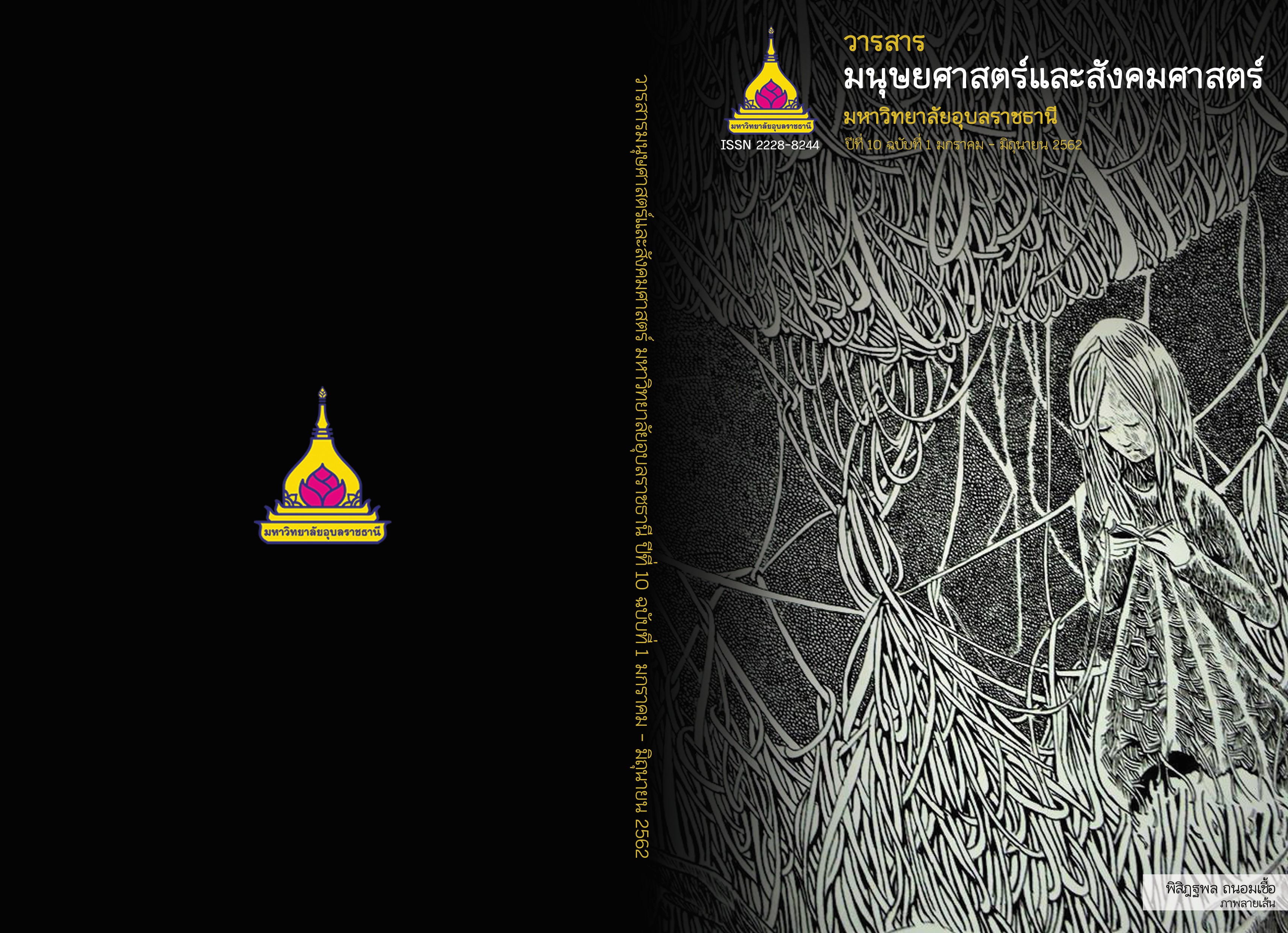ปัจจัยที่มีอิทธิพลต่อการตัดสินใจทำการเกษตรแบบพันธสัญญาของผู้ประกอบการธุรกิจพลังงานไฟฟ้าชีวมวลของไทย
Main Article Content
บทคัดย่อ
การศึกษานี้มีวัตถุประสงค์เพื่อศึกษาปัจจัยที่มีความสำคัญต่อการตัดสินใจในการทำเกษตรแบบพันธสัญญาของผู้ประกอบการธุรกิจพลังงานไฟฟ้าชีวมวลของไทย โดยอาศัยแบบสอบถามในการเก็บรวบรวมข้อมูลจากผู้ประกอบการธุรกิจพลังงานไฟฟ้าชีวมวลของไทยที่ให้ความร่วมมือจำนวน 113 ราย และทำการวิเคราะห์ปัจจัยองค์ประกอบเชิงสำรวจ (Exploratory Factor Analysis) และสถิติวิเคราะห์ถดถอยพหุคูณวิธี Enter ซึ่งผลการวิเคราะห์ พบว่า การตัดสินใจในการทำเกษตรแบบพันธสัญญาของผู้ประกอบธุรกิจพลังงานไฟฟ้าชีวมวลของไทยได้รับอิทธิพลจาก 3 ปัจจัย คือ 1) ความสามารถในการแข่งขันกับธุรกิจพลังงานไฟฟ้าจากพลังงานทดแทนอื่น 2) ปัจจัยด้านวัสดุชีวมวลที่ใช้สำหรับการผลิตพลังงานไฟฟ้า และ 3) ศักยภาพของเกษตรกรในระบบเกษตรพันธสัญญา โดยปัจจัยด้านความสามารถในการแข่งขันกับธุรกิจด้านพลังงานทดแทนอื่นส่งผลสูงสุด โดยมีค่าสัมประสิทธิ์การถดถอยเท่ากับ 0.298 และปัจจัยด้านศักยภาพของเกษตรกรในระบบเกษตรพันธสัญญาส่งผลน้อยสุด ซึ่งมีค่าสัมประสิทธิ์การถดถอยเท่ากับ 0.166 สำหรับปัจจัยที่เป็นสาเหตุทางอ้อมต่อในการทำเกษตรแบบพันธสัญญาของผู้ประกอบการธุรกิจพลังงานไฟฟ้าชีวมวลมี 2 ปัจจัยคือ 1) นโยบายส่งเสริมและสนับสนุนพลังงานไฟฟ้าชีวมวลของรัฐบาล และ 2) การยอมรับของชุมชนและความรับผิดชอบต่อสิ่งแวดล้อมในพื้นที่ โดยมีค่าสัมประสิทธิ์การตัดสินใจ (R2) เท่ากับ 0.575 และ Durbin-Watson เท่ากับ 1.838
Article Details
บทความที่ได้รับการตีพิมพ์เป็นลิขสิทธิ์ของวารสารมนุษยศาสตร์และสังคมศาสตร์ มหาวิทยาลัยอุบลราชธานี
ข้อความที่ปรากฏในบทความแต่ละเรื่องในวารสารวิชาการเล่มนี้เป็นความคิดเห็นส่วนตัวของผู้เขียนแต่ละท่านไม่เกี่ยวข้องกับมหาวิทยาลัยอุบลราชธานี และคณาจารย์ท่านอื่นๆในมหาวิทยาลัยฯ แต่อย่างใด ความรับผิดชอบองค์ประกอบทั้งหมดของบทความแต่ละเรื่องเป็นของผู้เขียนแต่ละท่าน หากมีความผิดพลาดใดๆ ผู้เขียนแต่ละท่านจะรับผิดชอบบทความของตนเองแต่ผู้เดียว
เอกสารอ้างอิง
Bijman, J. 2008. Contract farming in developing countries: an overview.In Papers in Wageningen: Wagenigen University, Department of Business Administration.
Demirbas, A. 2009. Biofuels securing the planet’s future energy needs. Energy Conversion and Management, 50(9), 2239-2249.
Department of Alternative Energy Development and Efficiency. 2016. The Situation of Biomass energy to generate electricity in Thailand. https://webkc.dede.go.th/testmax/node/153. Jul, 5. (in Thai)
Department of Alternative Energy Development and Efficiency. 2015. AlternativeEnergyDevelopment Plan: AEDP 2015. https://www.dede.go.th/download/files/AEDP2015_Final_version.pdf.Jul, 29. (in Thai)
Hodgson, G. M. 1998. Competence and contract in the theory of the firm1. Journal of Economic Behavior & Organization, 35(2), 179-201.
Humphrey, J., & Memedovic, O. 2006. Global value chains in the agrifood sector.In Papers in UNIDO Strategic Research and Economics Branch,edited by Memedovic, Olga: United Nations Industrial Development Organization
Kasikorn Research Center. 2015. Business Opportunities inRenewableEnergySector.https://www.kasikornbank.com/th/business/sme/KSME Knowledge/article/KSMEAnalysis/Documents/BusinessOppotunity.pdf. Sep, 26. (in Thai)
Kumar, A., Kumar, N., Baredar, P., & Shukla, A. 2015. A review on biomass energy resources, potential, conversion and policy in India. Renewable and Sustainable Energy Reviews, 45, 530-539.
Larson, J. A., English, B. C., & He, L. 2008. Economic analysis of farm-level supply of biomass feedstocks for energy production under alternative contract scenarios and risk. Integration of Agricultural and Energy Systems, 12.
Mackintosh, M. 1989. Gender, class and rural transition: agribusiness and the food crisis in Senegal. Zed Books.
Murray, C. 1987. Class, gender and the household: The developmental cycle in Southern Africa. Development and Change, 18(2), 235-249.
Prasertsan, S., & Sajjakulnukit, B. 2006. Biomass and biogas energy in Thailand: Potential, opportunity and barriers. Renewable energy, 31(5), 599-610.
Shabani, N., & Sowlati, T. 2016. A hybrid multi-stage stochastic programming-robust optimization model for maximizing the supply chain of a forest-based biomass power plant considering uncertainties. Journal of Cleaner Production, 112, 3285-3293.
Shastri, Y., Rodríguez, L., Hansen, A., & Ting, K. C. 2011. Agent-based analysis of biomass feedstock production dynamics. BioEnergy Research, 4(4), 258-275.
Singh, J. 2015. Overview of electric power potential of surplus agricultural biomass from economic, social, environmental and technical perspective—A case study of Punjab. Renewable and Sustainable Energy Reviews, 42, 286-297.
Sriboonchitta, S., & Wiboonpoongse, A. 2008. Overview of contract farming in Thailand: Lessons learned.In Papers in ADB Institute Discussion Papers, No. 112.
The Energy Policy and Planning Office(EPPO). 2016. Alternative Energy Development Plan (AEDP2015). https://www.eppo.go.th/index.php/th/ plan-policy/tieb/aedp. Jul, 15. (in Thai)
Williamson, O. E. 1979. Transaction-cost economics: the governance of contractual relations. The journal of Law and Economics, 22(2), 233-261.
Young, L. M., & Hobbs, J. E. 2002. Vertical linkages in agri-food supply chains: changing roles for producers, commodity groups, and government policy. Review of Agricultural Economics, 24(2), 428-441.


